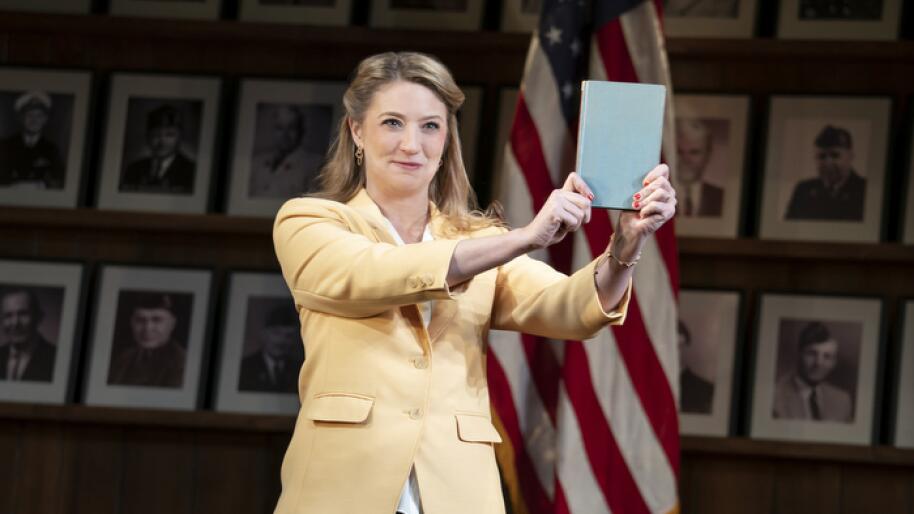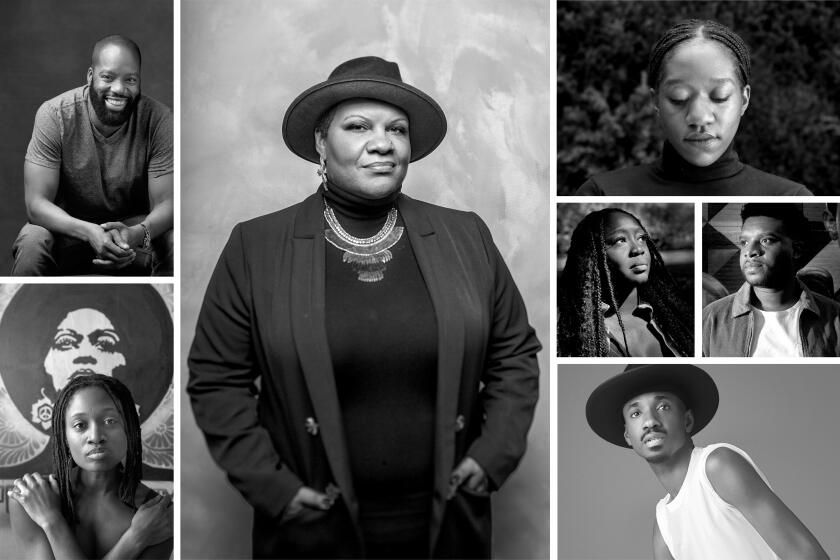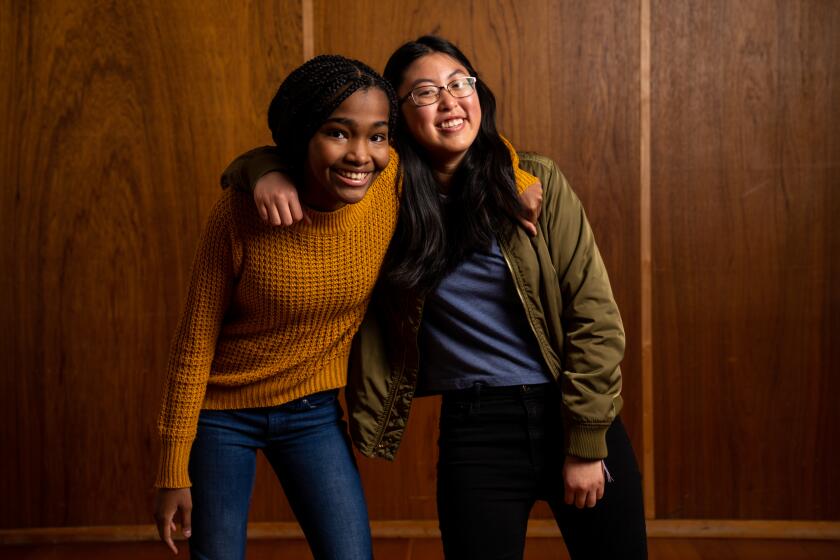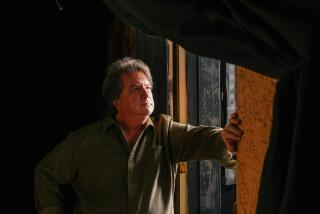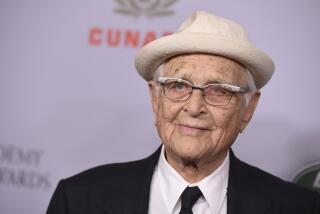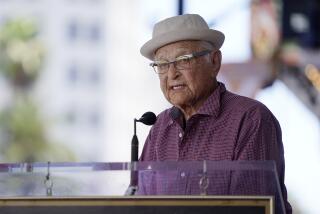Heidi Schreck and Norman Lear on abortion, ‘Maude’ and deflecting the haters
The ghost of Ruth Bader Ginsburg pays a friendly visit in “What the Constitution Means to Me,” the Broadway hit by Heidi Schreck that drops Friday on Amazon Prime Video.
“People ask me sometimes, when do you think there will be enough women on the court?” says the recorded voice of Ginsburg, her supreme sound filling an otherwise hushed Hayes Theater. “And my answer is: When there are nine.”
For the record:
11:38 p.m. Oct. 21, 2020An earlier version of this article misspelled Ruth Bader Ginsburg’s last name as Ginsberg.
Women’s rights — or lack thereof, across generations of Americans — is the subject of Schreck’s piece, a Tony Award nominee for best play and a finalist for the Pulitzer Prize. Schreck recounts her memories of herself as a 15-year-old traveling to American Legion halls across the West for constitutional debate competitions, and she uses that experience as the framework for an enlightening, funny, powerful discussion that Times theater critic Charles McNulty called required viewing for senators considering the nomination of Amy Coney Barrett to the Supreme Court.
The Tony Award nominations for a season shortened by the pandemic are cold comfort to all of the out-of-work artists who won’t return to Broadway before May.
With a presidential campaign nearing its climax and the Barrett confirmation hearings unfolding in our nation’s capital, The Times asked Schreck to interview Norman Lear, who himself participated in American Legion oratorical contests as a teenager. Lear, who revolutionized television with socially relevant series such as “All in the Family,” “Maude” and “The Jeffersons,” has long been a political activist. And he has a personal connection to “What the Constitution Means to Me” in his daughter Kate, who is a producer on the show.
What follows is their conversation about their teen speech experience, their forays into politics, the abortion debate, the demolition of civility in modern public discourse and where they find themselves in this pandemically complicated, politically fraught, socially turbulent moment in history. The video posted with this article is a shortened version of their talk; the text here reflects the full conversation, lightly edited for clarity.
Heidi Schreck: We met backstage after the show at an oratory contest. I wondered if you remembered by any chance the title of your speech.
Norman Lear: Yes, indeed, I do remember. It was called “The Constitution and Me,” and the basic subject matter was I wondered if the Constitution meant more to a member of a minority. I’m Jewish. Did it mean more to a Black person, to a Hispanic person, to a Jewish person — a member of some type of minority that counted on it more, perhaps, or leaned on it more, or understood it to be there more often than somebody who was clearly in the majority.
And what was the answer to your speech? Yes, they did?
I thought so. In my case, I marveled more at what the founders delivered for me — to protect me and assure me that we were all equals as citizens.
Radha Blank’s ‘Forty-Year-Old Version’ on Netflix highlights racism in the theater industry. We asked 40 Black theatermakers for their stories.
I think that was my view too as a 15-year-old. And then I think, while making this play, I started to wonder if that was actually true. So I’m interested in today, especially with the hearings that are going on right now, I guess I’m interested in probing the question of how much it is actually protecting us.
I know that you’ve long been an activist. In 1980 you started People for the American Way; you traveled the country with the Declaration of Independence in 2000. And I wonder how you feel about what’s going on today in relationship to our Constitution and if you think the Constitution can be relied upon to help us move through this moment.
It can be relied upon if a sufficient amount of people are doing just that: relying upon it, and voting in accordance with an understanding of how important the Constitution and everything about it means at this particular time.
As the father of six kids and four grandkids, I’m not sure in my 98 years I’ve seen another moment as worrisome as this, in terms of the America I believe I grew into as a boy, protected by the Constitution and the Bill of Rights.
That was the question I wanted to ask you, given that you have seen more happen in this country than many of us. To a lot of us, this feels like such a grave emergency, such an intense constitutional crisis, a crisis facing our country. Have you felt another moment that feels as intense as this one?
Yes, I don’t know if it’s as intense as this one. Perhaps because I have my six kids and my grandkids and didn’t at the time I’m about to refer to, I’m more sensitive to these concerns.
I didn’t wake up any morning to start an organization, which became People for the American Way. I was concerned about the Pat Robertsons and the Jerry Falwells and the Jimmy Swaggarts who were gaining a lot of attention on television mixing politics and religion. That was anathema to my understanding of the Constitution — the mixture of politics and religion. So I filmed a 60-second television spot with a working stiff on a piece of factory equipment at a factory, and he was simply talking about, “Me and my wife and my kids, we talk about politics all the time around the dinner table. We don’t agree about a lot of things. But nobody says we are good Christians or bad Christians depending on our political point of view. We don’t talk that way to each other, we don’t believe that. That’s not the American way.”
Interestingly enough, the appointee to the Supreme Court comes from Notre Dame. I knew Father Hesburgh [the Rev. Theodore Hesburgh, president of the University of Notre Dame from 1952 to 1987] well, and I flew there with my one-minute spot and showed it to him. And he said, “It’s really good, Norman. You’ll find that mainline church leaders like me agree with it totally. And I want to send you and this spot — take it to a half a dozen mainline church leaders that I’ll give you the names and addresses, and I’ll call them in advance to expect you.” Which he did.
Wow.
I did travel the country and talked to these leaders. I think it was the head of the Lutheran Church — in his office, somebody else was present who said, “You know, this spot is wonderful and I’m glad you’re able to run it, and I hope you can raise enough money to run it a lot. But I think you ought to organize around it. I love the last line, ‘That’s not the American way.’ Why don’t you become People for the American Way?” And that’s exactly what happened.
In the show I tell the story of having an abortion when I was a young woman, and a lot of people have come up to tell me and said they appreciate me telling that story because these stories don’t get told that often, even though one in three, maybe one in four women have had an abortion by the age of 45. But I happen to know — and I know this because of my mom — that in 1972, in your show “Maude,” you actually had a story about a 45-year-old, 48-year-old woman deciding to have an abortion — Maude, played by Bea Arthur. I went back and read about that and was thinking about that episode.
First of all, I want to thank you for doing that. I feel like that influenced my mom, who then influenced me in terms of growing up believing that a person has a right to autonomy over their own body and their own medical choices. But it also depressed me a little bit because here we are in 2020, when people are surprised that I’m telling the story of an abortion in my play.
Given the hearings that are going on right now, I wonder — you’ve made such groundbreaking work in so many ways, but let’s just focus on this one thing, telling the story of an older woman deciding to have an abortion. I just wonder how you feel about where we are in relationship to that?
The last lines of that show saw Maude and [husband] Walter in their bedroom. She said to him — it was the quietest moment — and she said to him, “Walter, tell me I’m doing the right thing.” And his response was, “Maude, in the privacy of our lives, you are doing the right thing.”
“In the privacy of our lives” was so important, I thought. Does a woman have the right in the privacy of her own life to deal with her problem as she sees fit.
I have a child who is Catholic. We were at her baptismal like two years ago. I could not love a human being more than I love this woman, and she’s on the other side of that issue.
Right. I was reading a tweet yesterday where someone said if you don’t believe in abortion, don’t have one. The idea that we have the right to decide what to do with our own bodies, and the right to make a decision that’s a very complicated one seems to be the fundamental thing that’s at risk right now. I’m really interested in how that episode was received. I know that the majority of Americans at that time, just like now, don’t think Roe v. Wade should be overturned. I just wonder what the response was like in — it was 1972?
It was very favorably received. Of course I got some hate mail. I don’t remember anything overwhelming about a negative reaction to it. I do remember much more applause that at least it was discussed, even if there were people who disagreed with her final decision. But at least the subject was discussed on national TV.
I think the majority opinion hasn’t changed. The majority of Americans for a very long time have supported a person’s right to control their own reproductive freedom. Yet we have a very loud minority taking control of the conversation. I’m just confused as to how that happened, although you brought it up with the religious right earlier.
I’m very worried right now that what’s happening is we will end up with a court that doesn’t actually reflect the will of the people. The people for the most part support marriage equality, they support Roe v. Wade, they believe that police violence against Black people is a problem, they’re not anti-immigrant. Yet we’re going to have this court that does not in fact reflect what the majority of people feel. You’ve studied a lot of history and you have seen a lot of things — do you think there is a way to move toward having a Supreme Court that actually does reflect the will of the people?
What concerns me most is — in 1980, when starting People for the American Way, I was concerned about the voices on TV growing more and louder, mixing politics and religion, as I said. But I don’t recall people in the streets marching and showing hateful signs of anti-Semitism, anti-protesters, anti-liberals. That worries me considerably now. We have someone in the Oval Office who in a way encourages all of that by virtue of not attacking it.
Right, and perpetuating it in his own way. I was going to ask how you deal with that kind of vitriol. This is my first foray into a larger arena with the show. And I’ve already gotten a tremendous amount of hatred directed at me for simply calling the Constitution a living document, which I firmly believe it is. But I have thousands of men on Facebook calling me a moron and a Communist and an idiot and stupid for calling the Constitution a living document.
Is that right? For calling the Constitution a living document? It’s always been called a living document.
I know! I know. I’m shocked at the level of, um — you know, the trailers make the show seem much more harmless than it actually is. They haven’t even seen the more difficult parts of the show. I’m curious how you deal with that kind of blowback. You’ve put a lot of work out there that I know has been beloved and also controversial. How do you deal with that, particularly now at a moment when the hatred is so openly expressed.
You go with your gut. My first response is go with your gut. This is the way that I feel it should be, this is the way that I have to deliver it — whatever it is that I’m doing or saying. I’ve had the good fortune of dealing with all these subjects with laughter, finding the humor somewhere.
The human condition doesn’t change, whatever the point of view. What I like to think of as the foolishness of the human condition persists in the most serious moments. I’ve been fortunate enough to find and locate it and work with actors and other writers who appreciate, from the depths of their souls, the foolishness of the human condition.
Speaking of that, I have to say that Marisa Tomei’s portrayal of Edith Bunker was one of the …
Isn’t she wonderful.
Oh my God. I had to watch it several times. She was perfect. Edith very much reminded me — I was born in ‘71, so I started watching [“All in the Family”] in reruns when I was a young girl, and she was so much like my grandmother on my dad’s side. Marisa just captured that so perfectly. Edith also gave me a new appreciation for my grandmother because my grandmother was very deferential, she had that high voice, was always tiptoeing around my grumpy grandfather. But she was clearly smarter than he was! And also able to push back in all these ways that I talk about in the show. This is what is called “covert resistance.”
Like Edith, that grandmother must have been as solid aS a rock.
Absolutely.
That was the secret with Edith. We dealt with that in perhaps my favorite episodes. Edith loved a — it happened to be a transgender woman — who was killed In the streets for being who she was. And Edith lost her faith in God. How could a God allow that to happen? For a little period of time, a matter of a few episodes, she had lost her faith in God, which meant that she lost the source of her strength. And when she fell apart in her way, Archie couldn’t handle it. And we learned how much Archie depended on Edith’s strength. I loved dealing with all of that.
In some ways the show helped me see that in my own grandmother. My grandfather, who seemed like the strong one in the family — the way in which it was her strength that actually was guiding …
Heidi, we lived with the same grandparents.
[Laughing] That makes a lot of sense. I think you know this: My grandfather was in the Air Force in World War II. And I know that you were too. You know your photograph is up on the wall [of the “Constitution” set]?
Yes! Yes, I know that. Thank you so much for that.
It’s all in the set of our play. It’s row after row of Legionnaires. It’s row after row of white men. Sometimes people ask me, is that meant to be oppressive? Is that meant to be the judgment of the patriarchy? And I say, it’s not really as simple as that. It really is what I remember the Legion Hall looking when I was a teenager.
But also I’ve performed the show for three years, so I’ve gotten to know all those men very well, and I have a very personal relationship with all of them. So, sure, some of them maybe represent a kind of male force that I found oppressive in my life. But some of them — like you — represent a whole other kind of energy that I aspire to and that I’m grateful for and that I feel a great deal of love toward. So your picture being up there represents that to me. So I just want to thank you for looking over the show every night.
It’s hard to believe, as we talk now, that people aren’t gathering to go to the theater. That we’re living in a time where all of that is out of our lives for the time being. It hurts me.
Do you feel like — I just feel like our lawmakers need to do something to support the arts right now and to support all of the artists who are out of work. They’re going to be out of work longer than perhaps anyone else in this country. It makes me angry and depressed that our government values the arts and the theater so little that they’re not stepping up with any kind of relief.
I agree with you. The arts bring people together. There has not been a deeper spiritual experience for me than to sit in front of, and sometimes behind, an audience when they’re laughing. When 300 people laugh as one, they tend to come out of their seats, and roll a bit forward, and come back. A thousand people can cross themselves, and it wouldn’t be as spiritual to me as watching people laughing together, as one. My God.
I feel that deeply. I also think that the sound of silence in a theater when an entire audience is listening as one — it’s one of my favorite things.
I too. So I love you, Heidi Schreck! I love this conversation.
[Laughs] Thank you, Norman. That’s so much coming from you. I just want to thank you for everything you have created. The huge and beautiful effect you’ve had on our culture and on our country. It’s an honor to talk with you.
We’re all in it together. The billions of us.
When Heidi Schreck’s Broadway hit launches its national tour in Los Angeles, Sherman Oaks teen Jocelyn Shek will find herself in a most unlikely role.
More to Read
The biggest entertainment stories
Get our big stories about Hollywood, film, television, music, arts, culture and more right in your inbox as soon as they publish.
You may occasionally receive promotional content from the Los Angeles Times.
